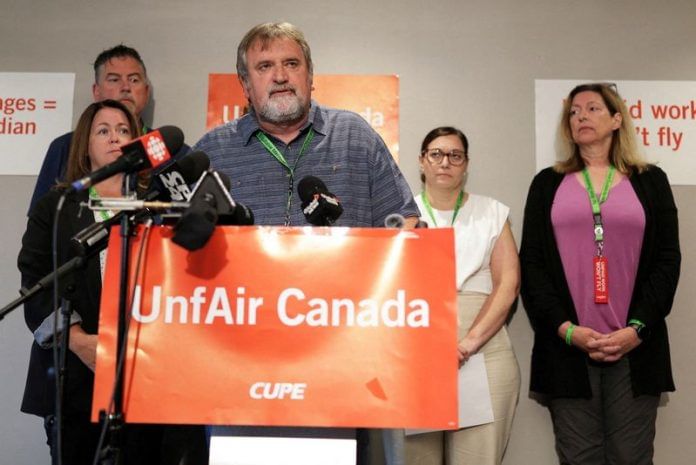By Allison Lampert, Rajesh Kumar Singh and Promit Mukherjee
MONTREAL (Reuters) -Air Canada’s CEO on Monday defended the airline’s offer of a 38% boost in compensation to striking flight attendants but acknowledged there was a big gap compared to the union’s demand and did not offer a path to return to negotiations.
CEO Mike Rousseau’s comments to Reuters followed the striking union’s refusal of a federal labor board’s order to return to work. That refusal has created a three-way standoff between the company, workers, and the government, and raised the stakes in the battle that has disrupted flights for hundreds of thousands of travelers during tourist season
Rousseau said he was amazed the union was not following the law. Flight attendants want higher wages and to be paid for time spent boarding passengers and other duties on the ground.
“At this point in time, the union’s proposals are much higher than the 40%. And so we need to find a path to bridge that gap,” he said, without suggesting what that process would be. “We’re always open to listen and have a conversation,” he said.
A leader of the union on strike against Air Canada said on Monday he would risk jail time rather than allow cabin crews to be forced back to work by a federal labor board.
The Canadian Union of Public Employees said the strike would continue until the carrier negotiates on wages and unpaid work, even after the Canada Industrial Relations Board (CIRB) declared the strike unlawful.
“If it means folks like me going to jail, then so be it. If it means our union being fined, then so be it. We’re looking for a solution here,” said Mark Hancock, CUPE national president, at a press conference after a deadline by the board to return to work expired with no union action to end the strike.
The union has said Air Canada’s offer only accounts for 17.2% higher wages over four years.
Canadian Prime Minister Mark Carney pleaded for a resolution. A domestic tourism boom has helped limit the economic damage from tariffs imposed by Canada’s biggest trade partner, the United States, and Air Canada is the country’s biggest carrier.
“We are in a situation where literally hundreds of thousands of Canadians and visitors to our country are being disrupted by this action,” Carney told reporters in Ottawa. “I urge both parties to resolve this as quickly as possible.”
Hancock said the union has not heard from the federal jobs minister or Air Canada since Friday.
The third day of a strike by more than 10,000 flight attendants has stranded passengers and led Air Canada to suspend its third-quarter and full-year 2025 guidance, sending shares down nearly 3%. The airline has earned lower profit due to fewer bookings to the United States.
The carrier normally carries 130,000 people daily and is part of the global Star Alliance of airlines.
Michael Lynk, professor emeritus of law at Western University in London, Ontario, said there are provisions in the Canada Labour Code that give the board and the court the right to issue fines and sanctions against the union and against individual workers.
UNPAID WORK
Crew are mostly paid when planes are moving, sparking demands by unions in the U.S. and Canada to change the model, and generating some vocal support from passengers on social media.
While passengers have largely expressed support for the flight attendants, some are growing weary of the uncertainty.
Danna Wu, 35, said she and her husband will have no choice but to drive from Winnipeg to Vancouver if the strike persists for a visa appointment. Although she believes Air Canada should pay its attendants more, the University of Manitoba master’s student added, “It’s not responsible to strike and leave thousands of passengers in such chaos.”
Air Canada’s demands on unpaid work follow gains recently won by flight attendants in the United States. New labor agreements at American Airlines and Alaska Airlines legally require carriers to start the clock for paying flight attendants when passengers are boarding.
The government’s options to force an end to the strike include asking courts to enforce the order to return to work and seeking an expedited hearing.
The minority government could also try to pass legislation that would need the support of political rivals and approval in both houses of parliament, which are on break until September 15, but has so far been cautious.
“The government will be very reticent to be too heavy-handed because in Canada, the Supreme Court has ruled that governments have to be very careful when they take away the right to strike, even for public sector workers that may be deemed essential,” said Dionne Pohler, a professor of dispute resolution at Cornell University.
The previous Canadian government intervened last year to head off rail and dock strikes that threatened to cripple the economy, but it is highly unusual for a union to defy a CIRB order.
“If you’re going to fine us or you’re going to try and take us on financially, then you can take us to court, and we can see where that plays out,” said Hancock.
(Reporting by Allison Lampert in Montreal, Promit Mukherjee in Ottawa, Ryan Patrick Jones in Toronto, and Rajesh Kumar Singh in Chicago. Additional reporting by Gertrude Chavez-Drefuss and Doyinsola Oladipo in New York, Kyaw Soe Oo in Toronto and Aishwarya Jain in Bengaluru; Writing by Peter Henderson and Caroline Stauffer; Editing by Frank McGurty, Marguerita Choy, Arun Koyyur, Rod Nickel)
Disclaimer: This report is auto generated from the Reuters news service. ThePrint holds no responsibility for its content.




